''Myanmar military first killed all Rohingya leaders, eliminated the elite''
The life of the Muslim minority in Burma. The view of a Kazan citizen who visited Myanmar and Bangladesh
Video blogger Rasul Tavdiryakov and journalist Orkhan Dzhemal have recently departed for Bangladesh and Myanmar. The Muslim media people went to find out how reliable the information about the troubles of the Rohingya is, as well as to provide humanitarian assistance to Muslim refugees from Rakhine State. Tavdiryakov, who is now being in Myanmar, told in an interview with Realnoe Vremya what horrors he has witnessed and horrible stories he was told by the Rohingya.
''Thousands of bloody people with stab wounds''
Rasul, what has prompted you to go to Bangladesh?
The desire to know the truth inspired me to go to Bangladesh: what is happening to the Rohingya, whether it is true what is described in social networks, Islamic and other sites. In recent times, we've seen a lot of information, horrible pictures, terrifying videos. But the sources were usually not credible. Sometimes someone translates from Al-Jazeera or English-language websites. But it was not like someone of my friends or serious agency went there, investigated. In this connection I had doubts about the veracity of such information of some people, including Islamic preachers and spiritual leaders that they expressed publicly. I decided to go to the place of events myself to find out.
The only one who could give objective and more or less real information, tell about the ongoing situation, is lawyer Murad Musaev, whom I trust. He was the first source of more or less reliable information. I watched his interview. Then I came to Moscow, talked with him. Murad told about what he saw, what documents he worked with. He said that after communicating with the Rohingya he went to London and worked there with documents, because the UK is the former metropolis of Bangladesh and Myanmar (Burma). So I decided to go to this country in Southeast Asia.
Then I called my old companion, a Bengali Muhammad Amin Madzhumder who previously lived in our country, studied, got married, and for a while was the head of the Federation of migrants of Russia. He has recently returned to his homeland and now heads the organization United muslim ummah and helps including the Rohingya — a people professing Islam. He told me that in Bangladesh there was a large refugee camp where people came to help people from different countries. He promised that he would meet me, show me everything, would be a translator. He took on all organizational work, providing me great support.
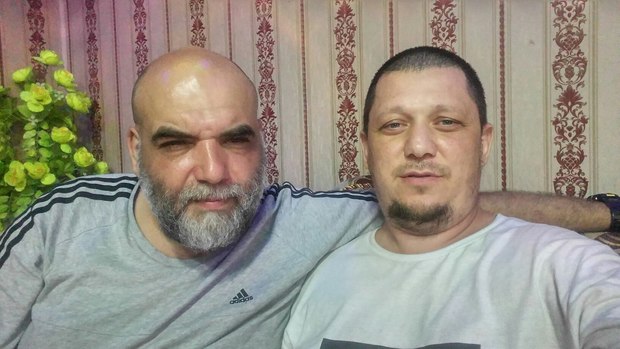
How did you get to the refugee camp in Bangladesh? Why didn't you go directly to Myanmar?
At first, we wanted to enter the territory of Myanmar and record ourselves the facts of ethnic cleansing or at least burned villages. Because at different forums they said, ''Why are you going to the Bengalis and their refugees? Maybe they purposefully appeal to feelings? Maybe in Myanmar the situation is not so terrible, everything is different. They are fleeing of their own violition to receive humanitarian assistance, not to work and live.''
On the first day when we were in Bangladesh, we went by tuk-tuk (auto rickshaw) to the border with Myanmar. However, when the rented transport brought us to the border, a military who was on the checkpoint started to dissuade us from our idea because it was very dangerous for life. Second, the officer himself would have problems if we tried to get there. As he said, Burmese soldiers open fire when someone tries to infiltrate from Bangladesh. It is believed that they do this in order the Rohingya couldn't return from the refugee camp. ''They may not recognize Europeans and will open fire on you. I will be forced to open fire in response, too. A serious political scandal can emerge. Everyone would have problems,'' he tried to persuade us to put our plan aside.
The locals also highly advised us not to approach the border and not to cross it because they described the military of Myanmar as bad people who shoot and kill for no reason. I had the feeling that they were some kind of killer-cyborgs, hungry for blood.
According to locals, whose villages are in 800 metres from the river separating the two countries, from those side there were coming thousands of bloody people with stab wounds, women in torn clothes; it evidenced that they were raped. They saw floating on the river dead children, who either drowned, choking in the water, whether they were exhausted after a long transition, or they died of their wounds. The locals also said that at one time the fish did not bite because they were not hungry. On this side of the river (from Bangladesh) crows disappeared because the birds went to the other side to eat the corpses of Muslims. The Bengali villages did not see the crows for a few weeks. Our hair stood on end from these horrible stories. By the way, it has been recently reported that in Myanmar near the border there have accumulated 80,000 refugees and 20,000 have crossed the river. Unfortunately, we did not manage to record it.
After talking with the border guards we went along the river and saw the smoke. It was evident that it was not a stove stoking and not a fire burning but like a whole building was firing: a thick column of smoke was rising into the sky. Local residents said that they saw regularly such smoke, and it was the houses of the Rohingya burning in Myanmar. By the way, the military told us that on the other side of the border the villages were being burnt. We did not see the fire itself which hid the forest across the river. But we noticed two columns of smoke.
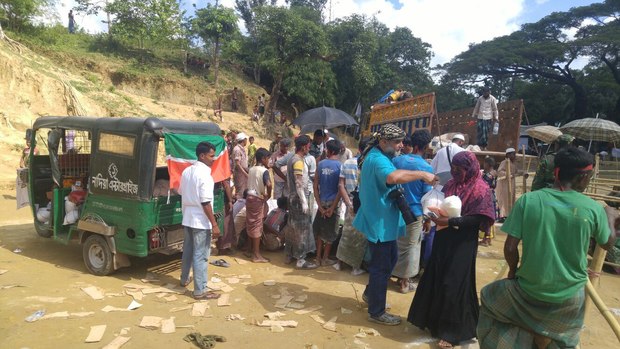
''The Bengalis are compassionate people''
How do the Bengalis meet refugees from Burma?
The Bengalis are compassionate people. Many of them help. There are also several charity organizations, foundations, representatives of different Muslim jamias, sufis, non-Muslims. Here people come with clothes, food and even some pipes for sewage. The Bengalis are surprisingly solidary with these people.
Have you communicated with Bangladeshi Buddhists? What do they say about the problem?
There are Buddhists both moderate and radical. Moderate Buddhists tell about the Rohingya issue that it is a political conflict between the two states, they do not interfere and decline to comment. According to them, Buddhism is the religion of peace and everything that is happening is not relevant to them.
But I also listened to a radical Buddhist from Bangladesh: he supports the actions of the government of Myanmar against the Rohingya as he considers them criminals, terrorists associated with Al-Qaeda, he thinks they are controlled from Pakistan. He said the following, ''They rob, rape, kill, do not want to work. Why do people flee from Myanmar to Bangladesh? In order not to work, to live on humanitarian assistance for drugs. They are not killed there, their activity is just blocked so that their evil did not spread throughout the country and they didn't spread their way of life.'' This emotional comment was told us by a Buddhist monk, and apparently quite significant person (judging by his burgundy dress). He was going to fly to Myanmar for a meeting.
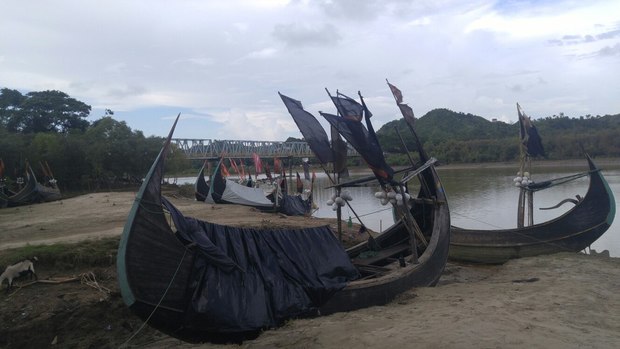
We asked him, ''Is it possible to go to Rakhine (Arakan) and to communicate, to ask why they are involved in terrorism?'' He said that the army would not allow foreigners because they protect the health and lives of foreign citizens because the extremists can seize them as prisoners then demand a ransom. In his words, they are bandits, the lowest of the low that can be on this planet.
What is the quality of life of the Bengalis? What are the living conditions?
The standard of living of the Bengalis is very low. Everywhere there is poverty, lots of beggars. The streets are dirty, a lot of garbage. The drain is arranged under the land not as we have but on the surface: it all flows through ditches-aryks. On the streets there is constant bad smell. Environmental and economic situation is deplorable. It is difficult to be there. The humidity is high. But people do smile. I've never met evil people. The Bengalis are very kind and caring people.
''They believe Moscow to be implicated in the plight of the Rohingya''
How do people find out about the terror against the entire people in Myanmar?
A local journalist told us that the breakthrough of the information blockade was organized just by the same Bengali journalists. They were first to learn about the events that were happening with the Rohingya in Myanmar from the people themselves. They still continue to receive information and transmit it to the world: they post videos, photos. Or the information go the other way: the Rohingya from Rakhine State send messages to their relatives, which at the time moved to other cities of Myanmar, someone settled in the capital, someone assimilated. They contact with relatives, get photos and video footage and then give it to journalists of Bangladesh, and they, in their turn, send it to the world's media.
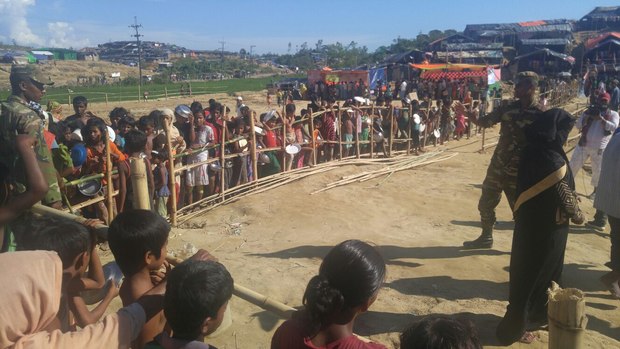
By the way, our friend journalist told us that the military first killed all Rohingya leaders, activists and more-or-less literate people. There have been left only peasants, who cannot express themselves or complaim anywhere, they do not know how to defend their rights. This people is so pressed, beheaded by destroying the elite, turning them into a vegetable. The pressure has been put for already several decades, and they treat everything as a normal process. They have almost no emotions. They calmly tell that their entire family was killed, someone was stabbed. I saw no tears. It may even seem that they made all this up. Sometimes you do not understand how they can so calmly tell about such disorder, inhuman attitude. A local Islamic journalist explained to us that they are such because they have already become accustomed with what is happening, they were born, they live in this space and do not know another life, that is why they tell about it as ordinary life story.
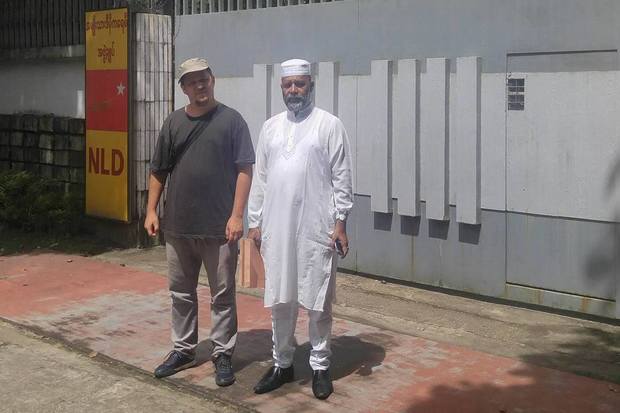
''People, journalists are lost in Rakhine''
Now you are being Myanmar. Have you found out from the mouth of believers and members of other faiths what is happening?
In Burma we stayed in a hostel, which is located in the same building as the mosque. Among Muslims there are locals, Bengalis, Indians, Chinese — different peoples. Here people prefer not to discuss the the Rohingya situation, avoiding the subject. It is clear that they become tense, afraid of something. I can feel their fear towards us: who are we and what do we want? Their fear is probably associated with the policy in the country. The military is not the least in the government, although formally the power has been transferred to civilians. One local Muslim, a Bengali by father's side and a local by mother's, strongly recommended to go to Rachkin, because in his words, people are being lost there, journalists — everyone who have a finger in the pie.
But ordinary Buddhists feel more freely, they are more willing to share their thoughts. So, a taxi driver, not a Muslim (apparently Buddhist), who was driving us from the airport, was complaining about the power a lot, who committed genocide and made the life of the people in Rakhine grim.
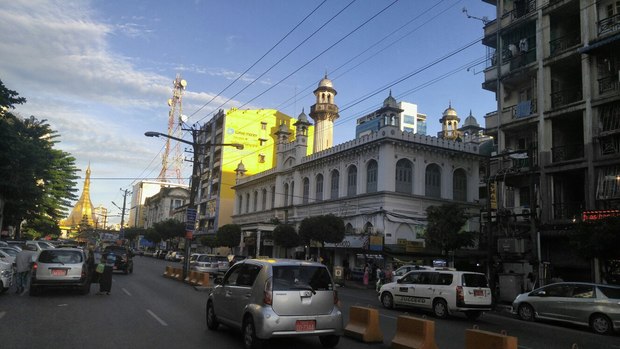
We also do not ask about Rakhine for every little thing not to cause unnecessary suspicion and not turn out to be in the police station. In general, Muslims try to avoid such conversations. We have met even Rakhine citizens. They say they can't get in their state and it is impossible to take out someone from there. The Rohingya whom we have met — those whose parents or grandparents went there when it was still possible to get out of the state for business purposes, education purposes, someone got married. One Rohingya, a member of the mosque, told me that the soldiers made it almost a concentration camp. The military do not even allow the prime minister and other government officials, to say nothing of ordinary tourists. There were cases when people came there secretly, but then no one have seen them.
You have already visited two countries and talked to Muslims and Buddhists. Is the situation with the Rohingya strongly exaggerated?
The situation is far not exaggerated. On the contrary, it is not covered properly. I believe that the responsibility of the journalistic community is to bring to the public truthful information about what is happening in the region.
This problem has not been fully investigated, it is poorly covered. It is impossible to get into the territory of Rakhine State. Even a film crew of BBC was not allowed. There are checkpoints. In other words, it is a high security zone, guarded by the military of Myanmar, where it is impossible to get. In Dhaka, we met with local journalists and agreed to exchange information.